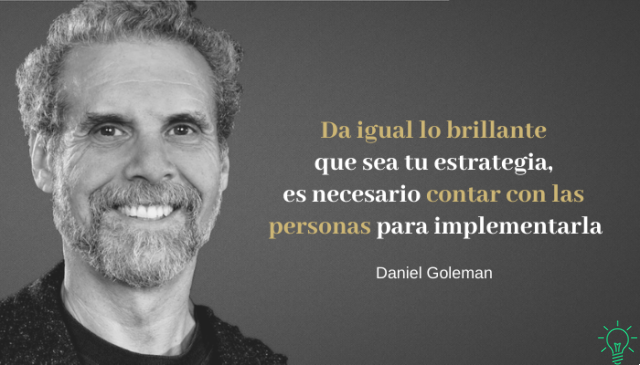
"Emotional Intelligence" by Daniel Goleman explains the importance of emotions in your life, how they can help or limit your ability to face the world. As well as why emotional intelligence is the key to a successful life, this essay also provides some practical advice on how to improve it.
The book "Emotional Intelligence" is Daniel Goleman's most famous literary work: sold 5 million copies around the world and has been translated into 40 languages. Goleman in this book explains how, in our brain, two separate minds live: one rational and one emotional. He also clarifies how the five skills that support your "emotional capacity" are critical factors in achieving happiness and success, and that they are often more important than IQ.
“We have two minds, one that thinks, the other that feels. These two modes of knowing, so fundamentally different, interact to build our mental life.
Daniel GolemanBelow you will find summarized the 3 most important lessons of the book:
- What is emotional intelligence,
- because it is essential
- How can you improve it?
PS: The book is available on Amazon at the following link:
Buy it at AmazonFirst lesson:
Emotional intelligence is based on your ability to be aware of yourself and be able to self-regulate.
There are two fundamental aspects that must be met to be emotionally intelligent. The first requirement is to be aware of your emotions, that is, to be able to recognize and classify your emotions.
"Self-awareness, in other words the ability to recognize a feeling as it occurs, is the cornerstone of emotional intelligence."
Daniel GolemanFor example, when a child learns to speak, he must learn the words to express himself before he can communicate with others. So if your son is angry because you don't let him eat sweets before dinner, he is aware that he feels angry, but he can't tell you exactly what he feels, at least not until you explain what he feels. . feeling is called anger.
The second characteristic required to be emotionally intelligent is the ability to control and regulate oneself.
As an adult, being able to manage your emotions at a meta level (through self-awareness, gained through meditation or other exercises) is critical to being able to choose whether and how to react to your feelings.
For example, when you sit in your office and hear a sudden, loud bang, like the sound of an explosion, your emotional center processes the event as a danger and puts your body on alert. But when your rational brain kicks in and sees that there is no real danger, you calm down to go back to what you were doing.
Each of these two qualities is fundamentally based on the neural connection that exists between your rational brain and your emotional brain. If this connection is absent, you may have serious problems in dealing with others and with the outside world in general.
Second lesson:
If you have a highly developed emotional intelligence, you are likely to be successful in life.
IQ is the quality that we generally believe is crucial to success. Goleman, on the other hand, through his research, has concluded that emotional intelligence is equally (if not more) important to the achievement of happiness.
“Emotionally competent people, those who know how to control their feelings, read those of others and deal with them effectively, are in an advantageous position in all areas of life, both in intimate relationships and in understanding the rules implicit assumptions that lead to political success. "
Daniel GolemanFor example, students with a higher level of empathy seem to be able to get the best grades, even though their classmates are just as smart. By being able to recognize emotions, they are also able to manage themselves better (for example: feeling bored but still doing their homework) and can also behave better in social settings (for example: knowing when to speak and when to keep quiet). in a given context). Children who are able to discipline themselves better at an early age are those who will "perform" better as adults.
"The only trait that really unites all effective leaders, if there is one, is motivation, a form of self-management that allows us to mobilize our positive emotions to project ourselves towards a goal."
Daniel GolemanIn addition to allowing you to discipline yourself, being able to recognize and manage emotions is also essential for someone who has to lead a group of people, as a manager may have to do. In that case, the ability to persuade another individual is crucial.
Your health also largely depends on your emotional intelligence, for the more gifted you are, the better you can mitigate stress, which is the root cause of so many illnesses today.
Third lesson:
You can improve your emotional intelligence simply by mirroring the body language of those in front of you (and thinking positively).
Okay, we've just seen the benefits of being "emotionally intelligent," but is there a way to improve this skill?
Yes, and there are two exercises that will allow you to develop your emotional intelligence:
Mirror the body language of those in front of you.
This first exercise will not only help you establish a connection with the person across the table, but it will also make you more aware of your emotions and attitude.
For example, when the person you are talking to has excellent posture, stretching your body will send subliminal messages to the subconscious of those in front of you, who will automatically trust you more. In addition, it will make you aware of what it means to assume a good posture and it will also make you more empathic, because at that moment you will know what the person in front of you must feel in that specific posture. It's one of those "fake it until you can" situations that allow you to develop better habits.
Always try to be optimistic.
This second exercise is to help you develop the resilience that characterizes people with high emotional intelligence. Optimistic people keep trying because they believe they can influence the end result through their actions and are therefore more likely to succeed. This depends on how they interpret failure. Purposeful people believe that negative events are temporary and that it is possible to improve certain situations through one's own actions.
So the next time something goes wrong, talk to yourself and say, "Okay, only this time it was, I'll get better, so next time will be better!"
"Emotional Intelligence" - Review
There are many essays that have only a few concepts of validity, while the remaining 200 pages of the book are just additional information, often redundant, added just to be able to publish it as a book. Well, Emotional Intelligence is NOT one of them. After a brief introduction to emotions and why they are so important, Goleman explains the concept of emotional intelligence, what it is made of, why it is essential, and how to improve it. The book is available at The Amazon and in almost all physical libraries.
Buy it at AmazonOther important concepts contained in the book:
- How your emotions help you remember things;
- When do your emotions cloud your thinking and how can they bypass your rational brain?
- How emotional intelligence can help you use your emotions to achieve your goals;
- Because emotional intelligence is at the root of your ability to cope with social interactions;
- How emotional intelligence can permanently heal or destroy our society;
- How to use your emotional intelligence in various situations, whether it's an argument with your partner or a problem at the office.
We had already talked about this book in another article:
5 books that will change the way you live
They may be interested in:
- 12 rules for life. An Antidote to Chaos - Summary
- 5 books that will change the way you live
- The Little Prince: The 7 Important Lessons From The Book
- You were not made to live like brutes, but to follow virtue and knowledge.
- The subtle art of doing what pisses you off - 3 valuable tips for life
- The 9 precious lessons of “The Alchemist” by Paulo Coelho


























